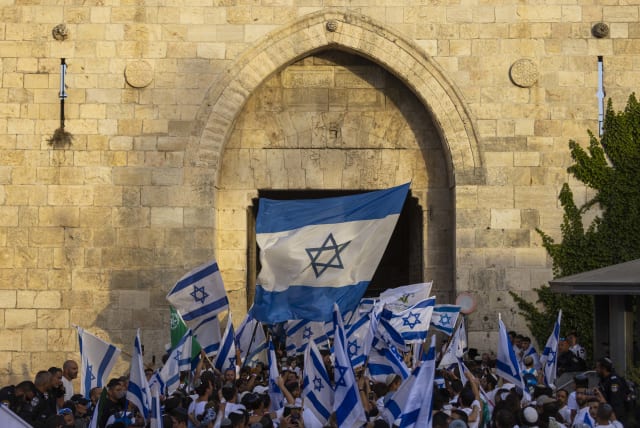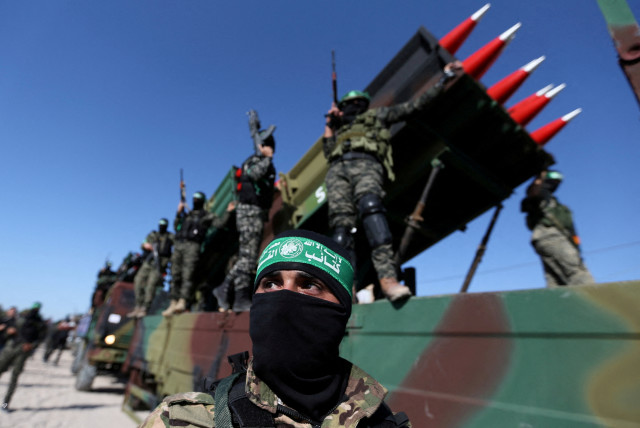Is the IDF worried about another round of conflict on Jerusalem Day? - analysis

Jerusalem Day will probably not go without incidents this year, but in terms of major threats, the intelligence outlook is actually much calmer than in recent years
On the one hand, there is every reason to think that Jerusalem Day could be a security disaster. The Jerusalem Post understands that IDF intelligence views Iran and its proxies as an even greater threat to Israel in 2023 than before.
Jerusalem Day is the best time for Hamas and Palestinian Islamic Jihad in Gaza, Hezbollah and other groups in Lebanon or Iranian proxies in Syria to start a conflict because “the fight for Jerusalem/al-Quds” is just about the only thing that all Muslims – Sunni or Shi’ite – agree on.
Anytime Israel is in a conflict with anyone over the Temple Mount, even its Arab allies – Egypt, Jordan, the UAE, Bahrain and (leading from behind) the Saudis – are more likely to condemn the Jewish state than for any other controversy.
Terror groups in Gaza, Lebanon and Syria all fired rockets or sent drones to attack Israel – or both – over the Ramadan/Passover holidays to show their solidarity with Muslim autonomous control over the Temple Mount.
Also, Islamic Jihad just showed it was ready to fire over 100 rockets at Israel over the death of one of its lead activists from the West Bank who were hunger striking while in Israeli detention, and another 1,400 rockets at Israel when the IDF killed some of its leaders in Gaza.
And in May 2021, Hamas used Jerusalem Day as its rallying cry for that 11-day conflict with Israel, in which it fired over 4,000 rockets at the Jewish state.
Even last year, when there was no greater battle, there were still multiple rounds of skirmishes between Palestinians on the Temple Mount and police and various Jewish worshipers.
Jerusalem Day 2023 will probably not be that dangerous
But almost all of these reasons can be easily reversed. Hamas may encourage more localized violence on the Temple Mount, a small number of rockets might be fired from somewhere into open fields and there could still be localized terror from the West Bank – which has continued on and off since March 2022.
On the other hand, Hamas and the other terror groups are probably less likely to make significant trouble for Israel surrounding this year’s Jerusalem Day than they have been in years.
If Islamic Jihad was going to fire rockets at Israel on Jerusalem Day, why agree to a ceasefire mid-conflict less than a week before?
The fact that Islamic Jihad just agreed to a ceasefire after many of its leaders were killed by the IDF will basically eliminate its “legitimacy” in the eyes of most of the Muslim world for restarting a conflict and claiming that it is just over Jerusalem.
Similarly, Hamas had ample opportunity to join either the August 2022 conflict or the one last week’s one last week between Israel and Islamic Jihad.
Despite its protestations for public consumption that it was involved in fighting Israel along with Islamic Jihad, Hamas overwhelmingly chose to stay on the sidelines.
The Post understands that IDF intelligence believes Hamas is currently being highly deterred from a conflict with Israel.
Hamas has benefited from a mix of Israel facilitating payments from Qatar as well as increasing numbers of Gaza workers being approved to come into the Jewish state.
Though public figures for worker numbers were set at 17,000, the Post understands that the numbers are now surpassing the 20,000 level.
All of this is a lot to risk for Hamas after it was battered hard in 2008-09, 2012, 2014 and 2021.
IDF intelligence also notes that Hamas has seen its counterpart leaders in Islamic Jihad blown up, whereas its current leaders have not been touched.
Hezbollah has some reasons to want to fight Israel symbolically, but following the 2006 Second Lebanon War, Hassan Nasrallah has kept the terror group from fighting Israel – now for around 17 years.
There is no obvious reason why he would change this policy beyond some symbolic skirmishes from time to time.
All of the above parties can also point to their attacks on Israel during Passover/Ramadan to show that they have not become too meek to fight. They can also point to localized “resistance” on the Temple Mount and possibly some symbolic rocket fire into open fields. Then they can say that this just is not the right time for another major round.
Although Iranian proxies in Syria might be the least deterred, they also are the weakest and most regularly hunted by the IDF’s “war between wars.”
Jerusalem Day will probably not go without incidents this year. But in terms of major threats, the intelligence outlook is actually much calmer than in recent years – specifically because the recent fights have been so intense.
Jerusalem Post Store
`; document.getElementById("linkPremium").innerHTML = cont; var divWithLink = document.getElementById("premium-link"); if (divWithLink !== null && divWithLink !== 'undefined') { divWithLink.style.border = "solid 1px #cb0f3e"; divWithLink.style.textAlign = "center"; divWithLink.style.marginBottom = "15px"; divWithLink.style.marginTop = "15px"; divWithLink.style.width = "100%"; divWithLink.style.backgroundColor = "#122952"; divWithLink.style.color = "#ffffff"; divWithLink.style.lineHeight = "1.5"; } } (function (v, i) { });

